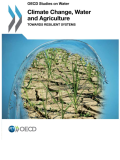This policy brief focuses on large hydropower infrastructure in sub-Saharan Africa. It investigates the climate change risks and the use of climate services in decision-making and makes recommendations for actions to enhance the resilience of hydropower schemes. It summarises a more comprehensive paper prepared to support the scoping phase of the Future Climate for Africa (FCFA) programme for the hydropower sector.
This Discussion Paper presents a normative concept of green industrial policy, which is defined as encompassing any policy measure aimed at aligning the structure of a country’s economy with the needs of sustainable development within established planetary boundaries. The paper elaborates on the rationale of a green industrial policy, how it differs from conventional industrial policy, why it is faced with significantly bigger challenges, and how these can be met.
Over the past decade, Asia and the Pacific has made significant progress in achieving the Millennium Development Goals. However, accelerating climate change is threatening to reverse these gains, and those who are already economically and socially vulnerable are likely to suffer soonest and most. To enable member countries cope with the inevitable impacts already locked into the climate system, as well as to transition them to low-carbon economies, ADB is working with urgency to put in place integrated solutions that will address both the causes and consequences of climate change in the region.
In 2009 to August 2011, ADB’s climate change-related interventions span a total of more than 110 projects, involving an investment of about $10 billion. During the same period, ADB has also provided more than $245 million in technical assistance to improve knowledge and capacities, support policy and institutional development, and ensure the feasibility of investments related to climate change.

Interactions between climate change, water and agriculture are numerous, complex and region-specific. Climate change can affect water resources through several dimensions: changes in the amount and patterns of precipitation; impact on water quality through changes in runoff, river flows, retention and thus loading of nutrients; and through extreme events such as floods and droughts. These changes in the water cycle can in turn deeply affect agricultural production in practically all regions of the world and have destabilising impacts for agricultural markets, food security and non-agricultural water uses. There is thus a strong case for considering agricultural water management and policy in the context of climate change. In the same way, a sound analysis of mitigation and adaptation strategies in the agricultural sector to climate change should place more emphasis on the water cycle.
